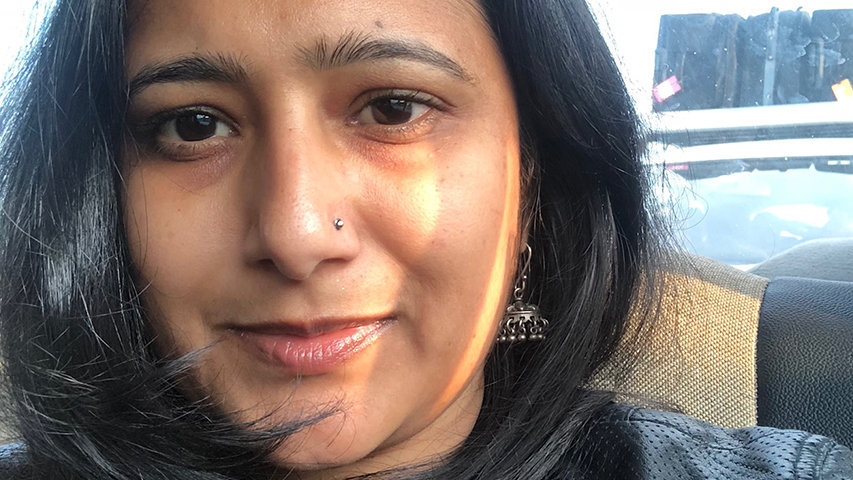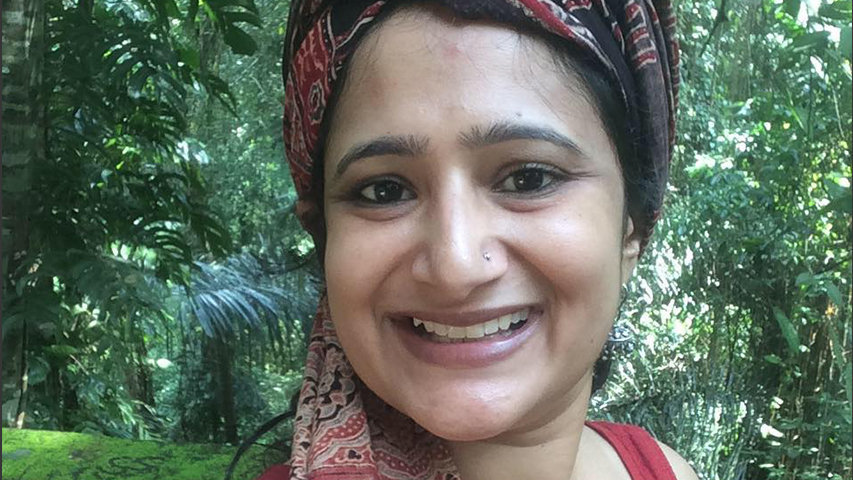
Menstrual Hygiene Day 2018: #NoMoreLimits
by Sukanya Sudarson May 28 2018, 4:46 pm Estimated Reading Time: 9 mins, 49 secsToday, 28 May, as the world observes the Menstrual Hygiene Day (MH Day), Sukanya Sudarson brings to you an e-interview of Nirmala Nair, the India Team Lead of the Berlin based NGO WASH United, which initiated the MH Day back in 2013.

Menstrual Hygiene Day is a global platform that brings together non-profits, government agencies, the private sector, the media and individuals to promote Menstrual Hygiene Management (MHM) and it raises awareness of the challenges women and girls worldwide face due to their menstruation and highlights solutions that address these challenges, including through media work. WASH United coordinates MH Day, develops overall campaign content and manages the MH Day network of more than 410 partner organisations.
Nirmala Nair leads the India team at WASH United and her work focusses on content development, campaigns and behaviour change communication across media. Her work bridges the gap between mainstream, popular content and purpose led socially relevant content. Her work focusses on issues like social-inequality, caste based discrimination, human trafficking, gender inequality, access to water and sanitation and menstrual hygiene management. User centric design thinking and participatory communication remain at the core of the methodology she follows while using different approaches to story-telling to bring about a change in attitudes and behaviours of people.
In the past, Nirmala has designed several campaigns, trained community media professionals and produced documentary films. She led the multi award winning MTV EXIT campaign in South Asia. MTV EXIT was the world’s largest behaviour change campaign in the fight against human trafficking and exploitation where her team designed and implemented innovative campaigns to equip young people make informed and empowered decisions. Here’s the conversation;

Q. Tell us something about yourself, your childhood and growing up years.
A. Growing up were happy times. I went to Sardar Patel Vidyalaya (SPV) and school still remains the institution that largely influenced who I am today. SPV encouraged us to stay away from the mob, even if it meant standing alone and it provided the self-belief to not be afraid. During my graduation years, I did a lot of street theatre, got exposed to realities of life that I was well-guarded from till then. It provided me the first-hand understanding and experience of inequality and the need to question it. It also gave me a deep sense of importance of the ‘voice of people’ and it helped me find a purpose in what I wanted to do.
Professional education happened at the National Institute of Design where I got exposed to the fascinating world of design thinking and form. So, I would say, ‘content’ of what I create today was shaped by experiences during school and college, but it was NID that gave me the vision to add a ‘form’ to it.
Q. What inspired you to initiate the Menstrual Hygiene Day on 28 May?
A. I did not initiate MH Day. It was initiated by the Berlin based NGO WASH United, and I work with them as the India Team Lead.
The interesting story is, MH Day is on 28th May keeping in mind that a menstrual cycle lasts for 28 days and periods last for 5 days therefore the 28th day of the 5th month is celebrated as MH Day.
Q. Menstruation is a normal biological process, why is it so difficult to talk about it openly, even amongst women?
A. Coming from a Malayali family, period was considered as normal as dinner at home. There was no shame or stigma and personally I have only suffered the physical pain during my period and nothing else. But I know a lot of women around me who find it difficult to feel the same because they did not grow up in families and surroundings that considered menstruation normal.
While menstruation is a biological process, there is a psychological, emotional and social aspect to it. Over 50% of girls in India are unaware of this normal biological process when they reach menarche and it leaves them with a feeling of fear, shame, a sense of guilt and inequality. Textbooks carry basic biological information about menstruation, provided those chapters are not skipped in class. But no one talks to the girls about the other aspects. They are left with questions and no one answers them. It is just not considered normal. To add to that, is the stigma and misconceptions around it which gets passed on from one generation to the other through the culture of silence. If a girl asks her mother a question, she is often told “aisa hi hota hai”. Leading her to accept misconceptions which have little scientific basis.
.jpg)
Source : WorldBank
Q. Tell us your experience making the digital campaign ‘NoMoreLimits’ with Dee MC.
A. Last year, we decided to run a digital campaign on MH Day to reach the young urban audience. The campaign was a huge success sparking conversations and debates and finally paving way to the wide range of discussion that took place about the subject over the past year. It helped break that barrier and let people feel conversations about ‘period’ don’t have to be boring and indirect.
This year, the theme of the campaign is empowering women and girls through good menstrual hygiene #NoMoreLimits. It’s been a very different experience this year round with conversations becoming deeper and the upcoming hip hop artist Dee MC coming on board with her powerful song:
Dee MC has been a pleasure to collaborate with. She wrote a special piece digging deep into her own experiences of facing stigma and segregation as a young girl and the confusion that it caused. Dee is a fantastic performer and a true champion as she was amongst the early ones to have signed the petition making it clear that it is important girls know what is happening to them before they hit menarche.
Q. Do you think the ‘views’ translate into ‘actions’? Any interesting episodes to share with us.
A. Oh, yes they do! We need to work beyond the online campaigns but the voice of the people is the most powerful tool we have as a democracy and we should not underestimate it. I feel when someone spares a minute to view, like, share, comment, they are sharing an opinion. Now it’s up to us how we use it.
The learning from last year was to include a tangible call to action to the campaign and this year we have launched a petition addressed to Hon. Minister Prakash Javadekar, asking the Ministry of Human Resource Development to make education on menstrual hygiene compulsory. The greatest response this year is the support people have shown to the petition. Launched less than a week ago, the petition already has 980 supporters and I hope it hits a 1K before this is printed.
We intend to take this petition to the Ministry and ensure that menstrual education includes the biological aspect along with conversations on stigmas, informed choice and use of products and its disposal and practical information on hygiene. It is an uphill task for sure and the results will take time. We have made a start and will continue to look for support from the people. If you believe it is important to education girls about menstruation – please sign here;
https://www.change.org/p/prakash-javdekar-make-menstrual-hygiene-education-compulsory-in-schools #NoMoreLimits
Q. A digital campaign works well in urban areas but how effective do you think they are in rural areas?
A. A digital campaign is meant for an urban audience therefore the design and visual language we use. It is not intended to work in rural areas. WASH United applies user centric design thinking to all its work and therefore doesn’t try to create one product that fits all. The ‘user’ is the centre of focus. The digital campaigning work is targeted towards urban youth, because they are the influencers and need to be a part of the conversation to ensure it reaches a wider audience through other media.
As for the work in rural areas, WASH United has been constantly reinventing it’s curricula for the field. Over the last year we have worked on a new set of material to be used in semi urban and rural areas. It is a story based tool that includes activity and play based methodology to introduce menstruation to young girls, and touches upon biological, emotional, psychological aspects as well as stigmas. The purpose of the product is to encourage girls to ask questions about their body and the normal biological process and not accept the status quo.
Q. There is a lot of stigma and silence surrounding menstruation, do you think movies like Toilet-Ek Prem Katha and PadMan will help break those shackles?
A. Of course, films help bring the conversation into the mainstream. But do they help a girl who is sitting confused inside the house? I don’t know. While PadMan has created a space for menstruation, my worry is it also makes it sound like sanitary pads are solution to the girls’ problems, which is not true. Sometimes I worry they take away the agency of the girl farther and conversations start centring around products and superstars while the girl and the woman who face the issues remain forgotten.
I also believe menstruation needs to have more women championing the cause. It is important for men to be part of the conversation and I truly appreciate what Akshay Kumar is doing. But we need to have women taking the forefront and leading the cause. (These are my personal views and not the organisations).
Q. On a personal level, what have been the challenges you faced while addressing such a sensitive issue?
A. Several. Like any work that questions the barriers created around ‘a woman’s place’ as decided by the patriarchal society, my work is too. I often get asked, ‘but what is the big deal about it?’ There are constant questions around why talk to an urban audience – and the truth is if we wish to make menstruation normal then we need to talk to everyone – rural, urban, girls, boys, women, men and the third gender and PWD. We started with an audience that is accessible through digital platforms. Let’s not allow the urban audience, which carried the same biases about a woman and perpetuates the same period myths as rural India, get away with it.
Creating awareness and providing education and support around menstruation impacts the self-efficacy of a woman. A girl who manages her period safely, hygienically, without stigma and with confidence has a better chance to reach her full potential in life. Therefore, menstruation is not just about girls and women. Conversations about menstruation cannot be limited to rural India. Young girls, women and men in urban areas need to join the conversation to help create a space where a woman feels confident to manage her periods. Every voice is important because at the end of the day, it is about empowerment of women and girls!
Q. What’s next? How do you see your efforts taking shape?
A. We definitely intend to take the petition forward. There will be more support required and we realise this is a long journey but we are totally prepared for it.
Our product for semi urban and rural India is ready and we will be launching it soon. Starting July, we will also be implementing the product through our partners and the local government with 10K girls in semi-urban and rural Andhra Pradesh.
It is very exciting times ahead and I am looking forward to it.





-173X130.jpg)

-173X130.jpg)
-173X130.jpg)
-173X130.jpg)
-173X130.jpg)
-173X130.jpg)